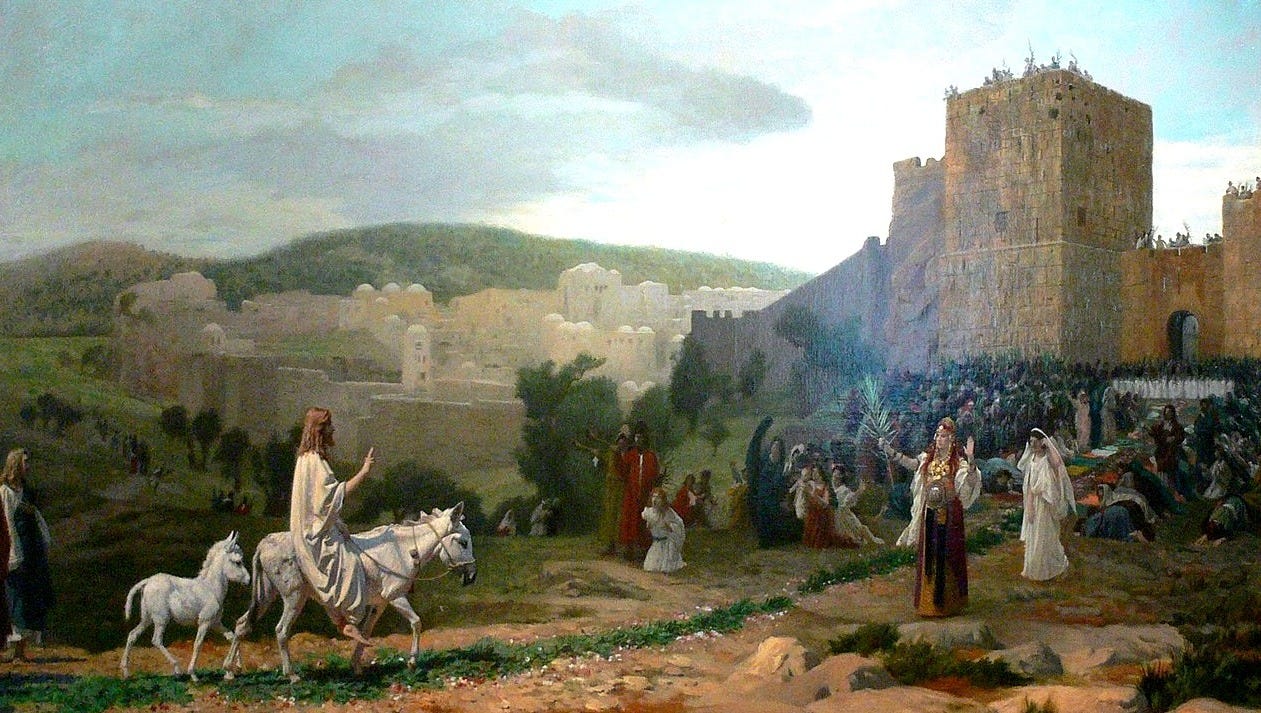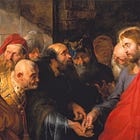Our Lord casts reserve aside and enters Jerusalem as Christ the King
When 'the hour' arrived, Our Lord openly manifested himself as Christ and King, in spite of the threats of his enemies.

When 'the hour' arrived, Our Lord openly manifested himself as Christ and King, in spite of the threats of his enemies.
Editor’s Notes
Palm Sunday is the start of Holy Week. Immediately after raising Lazarus from the dead, and a controversial supper at Bethany, Our Lord enters Jerusalem in triumph.
This unlike any of his previous arrivals into the Holy City. This time, he openly enters as Messias and King, and fulfils the prophecy of Zacharias in a way that makes his intentions unambiguous. He throws off his usual reserve: he accepts public praise, where previously he had deflected it. He defies his enemies with an even greater imperiousness than before, while defending the weak and those attacked on false grounds.
Most important to Fr Coleridge is Our Lord’s arrival at the Temple, for the purpose of offering himself as the sacrificial victim for the redemption of mankind—to be consummated less than a week later.
There is so much material that we could share during Holy Week. Rather than trying to provide it all, we will instead focus on how and why Christ’s triumphal entry into Jerusalem provides a key to the whole of his blessed and glorious Passion.
In this Part, Fr. Coleridge tells us…
How Christ’s triumphant entry defies all human caution and worldly prudence.
That even His enemies’ fury is harnessed for the fulfilment of divine prophecy.
Why He begins His Passion with outward splendour rather than concealment.
He shows us that God’s plan proceeds in majesty, even when surrounded by imminent danger.
The Procession of Palms
Passiontide, Part I, Chapter II
St. Matt. xxi. 14-17; St. Mark xi. 1-11; St. Luke xix. 29-44; St. John xii. 12-18.
Story of the Gospels, § 132
Burns and Oates, London, 1889
Headings and some line breaks added.
Sung on Palm Sunday
Our Lord casts reserve aside and enters Jerusalem as Christ the King
What was it about Palm Sunday that most surprised the Pharisees?
Danger to our Lord at Jerusalem
It was in the Providence of God that the great week in which the redemption of the world was to be worked out should be marked, at its very outset, with circumstances of unusual splendour, and in a manner altogether unprecedented in the course of our Lord’s Public Life.
Hitherto, though there had not been wanting signs of His great power, and acts of the highest authority, they had not been accompanied by any outward display of pomp and royal state. Yet, humanly speaking, He had now more than ever need of avoiding whatever might give a handle to His enemies for charging Him with ambition, assumption of authority, or an appeal to popular passion and enthusiasm in His favour.
After the great miracle of the feeding of the five thousand the people had been inclined to take Him by force and make Him a King. Then He had fled from the occasion of danger, which would have involved Him and His followers if any such attempt had been made. Now He was not in the distant and comparatively safe region of Galilee, where His adherents would have had only the power of the tetrarch Herod to cope with immediately. He was in the capital itself, and on the occasion of a feast which brought the Jews to Jerusalem in hundreds of thousands, and when the always jealous power of Rome was more than ever on the watch, ready to drown in blood the slightest movement of the national spirit which was the chief source of fear to the rulers of the world.
Hatred of the Priests
And, apart from the danger from the Roman power, our Lord was well aware that He had never approached the Holy City with more to fear from the malice and perfectly unscrupulous hostility of His enemies, who held the reins of government and who would not fear to wield all the power which they possessed for His destruction, the moment that an opportunity was given them, of compassing His death. We need not repeat what has already been said on this subject.
The circumstances of the present time were in many respects altered for the worse, as far as the danger to our Lord was concerned. The impossibility of meeting His claims and influence in any way short of His death, had become more evident since the great miracle of Lazarus. His teaching had become more pronounced than ever with regard to His own Divine Person.
The people were more than ever enthusiastic in His favour. During the last year He had brought the sphere of His more ordinary preaching far closer than before to the seat of authority and government. At the same time they were aware that He was more uncompromising than ever in His denunciations of themselves, and that it became more clear every day that He must either conquer them or that they must conquer Him. They had already determined His death, and they had also decreed that the innocent Lazarus, whose only crime could be that our Lord had raised him to life, must be removed as well as His Master. It was not enough to excommunicate all who believed in Him.
And just at this moment, as our Lord knew, the means which they had so long been seeking were ready to their hand. The Supper at Bethany had not passed without the incident which broke down the last lingering scruples of the false Apostle, and determined him to put into the hands of the enemies of our Lord the opportunity of possessing themselves of His Sacred Person, without tumult or publicity, whenever it might be most convenient.
Our Lord no refrains from braving this hatred
Thus, if our Lord had been guided by motives of human policy and prudence, He might on this occasion have abstained from any display of His power with the people, such as might have implied the loftiness of His claims on their allegiance.
We may say more. For on former occasions He had acted with the greatest consideration towards His enemies. He had shown this, twice and thrice over, by retiring from the neighbourhood of Jerusalem, or from Jerusalem itself, from fear of making their hostility to Him more pronounced and desperate. St. Matthew notices this among the fulfilments of the prophecies in our Lord’s Life:
‘[T]hat it might be fulfilled which was spoken by Isaias the prophet saying, Behold My Servant Whom I have chosen, My Beloved in Whom My Soul has been well pleased.
‘I will put My Spirit upon Him, and He shall show judgment to the Gentiles. He shall not contend nor cry out, neither shall any man hear His voice in the streets. The bruised reed He shall not break, and smoking flax He shall not extinguish, till He send forth judgment unto victory.
‘And in His name the Gentiles shall hope.’1
St. Matthew quotes these words early in his narrative. But now the time spoken of by the prophet as the ‘sending forth judgment unto victory,’ was come, though it was not to be a victory after the manner of the world.
Greatness of His work
Notwithstanding all human reasons against publicity and display on this great occasion, it was a part of the Providence of God that the first steps in the great act of the Passion should be taken with a certain amount of striking magnificence and solemnity.
Even in the eyes of man what was to be accomplished in the course of the few days, which were now beginning, was too great and too new and too far reaching in consequence and issues, to be passed over in silence. The great work of the ransoming of the world, the beginning of the new creation, the foundation of the eternal Kingdom of God, the reconciliation between Heaven and earth, the destruction of the works of the evil one, the victory over sin and Hell and death, the glorification of the Father by the Son in His Human Nature, and the exaltation of the Son of Man, was to be proclaimed to the whole universe, and celebrated by the highest praises that the creatures for whose behoof it was wrought could render to the Merciful Redeemer.
And so God had determined that it should be foretold that the Incarnate King was to come, in meek pomp and humble power, to the city which was to be the scene of so great a victory. What had thus been foretold by the prophets was now to be fulfilled. It was not to be done in a corner, though its circumstances of attendant pomp might perhaps move the enemies of our Lord to greater malice, and even seem to have precipitated the crime on their part which God had determined to permit for the accomplishment of His gracious designs for the salvation of the world.
They were but the instruments of His good pleasure, and the appointed work was not to be delayed a moment nor its course turned aside a hair’s breadth, for any considerations of the fury to which they might be goaded. The fury to which they might be goaded was to be used to the end of bringing about the crime which they were to perpetrate, and through it, the Redemption of the world.
The Procession of Palms
Our Lord casts reserve aside and enters Jerusalem as Christ the King
What was it about Palm Sunday that most surprised the Pharisees?
Read Next:
Here’s why you should subscribe to The Father Coleridge Reader and share with others:
Fr Coleridge provides solid explanations of the entirety of the Gospel
His work is full of doctrine and piety, and is highly credible
He gives a clear trajectory of the life of Christ, its drama and all its stages—increasing our appreciation and admiration for the God-Man.
If more Catholics knew about works like Coleridge’s, then other works based on sentimentality and dubious private revelations would be much less attractive.
But sourcing and curating the texts, cleaning up scans, and editing them for online reading is a labour of love, and takes a lot of time.
Will you lend us a hand and hit subscribe?
Follow our projects on Twitter, YouTube and Telegram:
St. Matt. xii. 17; Isaias xlii. 1.




